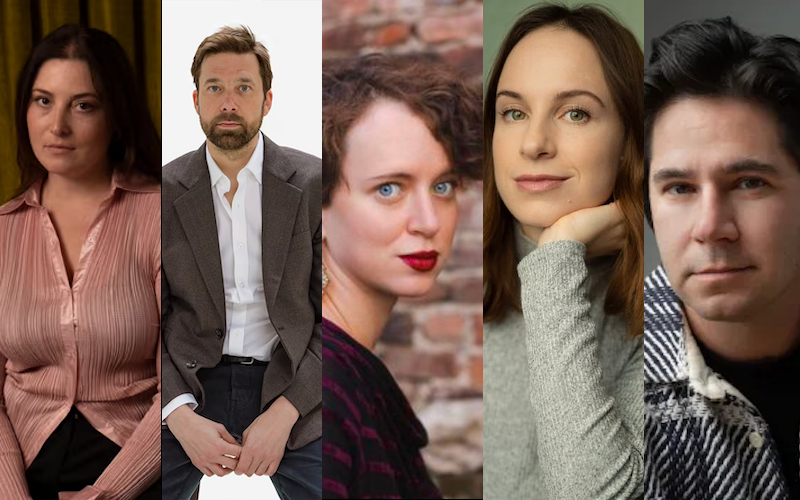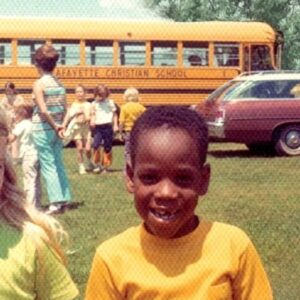
Lit Hub Asks: 5 Authors, 7 Questions, No Wrong Answers
Featuring Ella Baxter, Christopher Bollen, Eliza Moss, and More
The Lit Hub Author Questionnaire is a monthly interview featuring seven questions for five authors with new books (and for the end of the year, two with books we missed the first time around). This month we talk to:
*
Ella Baxter (Woo Woo)
Christopher Bollen (Havoc)
Tara Isabella Burton (Here in Avalon)
Ryan Chapman (The Audacity)
Eliza Moss (What It’s Like in Words)
*
Without summarizing it in any way, what would you say your book is about?
Christopher Bollen: A war of generations, age and youth, loneliness and reinvention, the beauty and wickedness of grand hotels.
Ryan Chapman: The Dada aspects of frauds, scammers, and extreme wealth. Art’s purpose inside a catastrophe. Boozy self-effacement. Sociopathy, assimilation, philanthropy, and classical music.
Ella Baxter: It is about obsession, and art making, and the process of becoming art through making art.
Eliza Moss: Love. Friendship. Feminism. Family. Home.
Tara Isabella Burton: A fairytale about the search for transcendence in a secular age.
*
Without explaining why and without naming other authors or books, can you discuss the various influences on your book?
Eliza Moss: Sundowners. Crabs scuttling sideways on a dark beach. Leaving Moscow. Homesickness. Being single in London in your twenties. Bad love stories. Good friendships. MeToo. Growing up. Shedding skin.
Ella Baxter: Surveillance, gardening, vengeance, burning things, burning food, rotting fruit, rotting houses, the idea of bacchanalia.
Christopher Bollen: This novel came to me in one great flash when I was sitting in the back garden of the Winter Palace in April 2021 watching an elderly woman, a guest at the hotel, berate the waiter about getting her lunch order wrong. But it’s also influenced by my love of old hotels, my respect for my elders, my fear of children, my love of horror, and my fear that one can almost justify and rationalize anything.
Ryan Chapman: The Negroni. Philip Guston’s turn to figuration. Paolo Sorrentino’s The Great Beauty and Andrew Haigh’s 45 Years. Julius Eastman’s piano compositions. The moment when, during a late-night meeting at Theranos HQ, an underling briefly heard Elizabeth Holmes’s real voice.
Tara Isabella Burton: I’m particularly influenced by the tradition of modernist novels about religion that attempt to explore the role that foundational stories—including fairy tales, Arthurian myths, and the like—play in a world that no longer believes in them. “Fairyland” as a construct was particularly important to me—stories of people who enter another, parallel world with different (or no) moral obligations: to me, fairyland is the quintessence of beauty/aesthetics without responsibility.
*
Without using complete sentences, can you describe what was going on in your life as you wrote this book?
Ella Baxter: Being stalked. Just given birth to a nine-and-a-half-pound baby. Marriage falling apart.
Eliza Moss: Peace in the Valley. Kadak chai. Theatres closing. Words. My cat. More words. More cat. Pantomime in a garden. Filming. Editing. Editing. Filming. Dinosaurs and ukuleles. Theatres reopening. Laptop next to my make-up; this is your five-minute call. Manhattans in the Ivy club. A birthday cake wedding cake. Ring on my finger that belonged to my grandma. Chipmunks and butter tarts.
Tara Isabella Burton: Trying to decide whether to stay or leave the Brooklyn neighborhood-hamlet of Red Hook, missing the altered reality (and literal honeymoon, in my case) of the strange 2020 summer.
Christopher Bollen: The world just coming out of the pandemic, literally leaving our bubbles. Coming out of an eleven-year relationship, selling a house in the country, moving on. Doing a nine-month residency in Paris. So a sense of escape and tragedy all around, tragedy and escape. And hope.
Ryan Chapman: Halved income to write fiction. Doubled happiness through pet adoption. Continued appreciation for life partner. Permanent skedaddle upstate. Misdiagnosis, correct diagnosis, the bliss of “it’s benign.”
*
What are some words you despise that have been used to describe your writing by readers and/or reviewers?
Ryan Chapman: “Plotless.” There is causality in my work, in the Forsterian sense. It just isn’t expressed through externalized action. Cards on the table: I obsess over this aspect of contemporary reading. While I enjoy shopworn convention in film and TV, I find it cloying and obsequious in literature. Is it that many of us confuse discomfort for distaste? What’s wrong with a little formal capsaicin? Perhaps readers in uncertain times desire small-c conservatism from the novel. Ironic, given it’s the only medium named for capital-c change.
Ella Baxter: That I am trying to be strange. I have spent my entire life trying to be normal. The strangeness is not constructed, its organic, a product of my upbringing or hormones or chemicals, and if I could cut the strangeness out of myself, I would.
Christopher Bollen: “Starts off too slow.” “I wanted to like the character more.”
Eliza Moss: Despise is a strong word, and I make efforts to remind myself that art is subjective and what other people think is not always my business. But ask me again in six months…
Tara Isabella Burton: Anything to do with The Secret History or Donna Tartt! And I don’t mind “Catholic writer,” per se, but although I get it a lot I’m not in fact Catholic! (I’m Episcopalian).
*
If you could choose a career besides writing (irrespective of schooling requirements and/or talent) what would it be?
Tara Isabella Burton: I’ve always dreamed of being a professional Pierrot-style clown.
Eliza Moss: Running an animal sanctuary.
Ryan Chapman: Jewel thief. Set your own hours. No Slack, no Zoom.
Christopher Bollen: I am, even as I approach 50 next year, still on the lookout for a serious career. I think writing has something to do with these sudden crush-like fascinations with so many divergent fields. Right now I’d like to be: a veterinarian, a gemologist, a cinematographer, a florist, a diplomat.
Ella Baxter: Therapist or horticulturalist.
*
What craft elements do you think are your strong suit, and what would you like to be better at?
Ella Baxter: I think I am good at narrative crescendos and writing chaotic characters but I would like to be better at writing non-fiction essays. I would like to profile interesting people. Drink martinis with them. Flirt.
Tara Isabella Burton: I love writing dialogue! I think like a playwright, which might also be my weakness—I have to constantly stop myself from over-describing people’s body language or gestures or reactions, or putting too much emphasis on them.
Eliza Moss: I think I’m good at immersing myself in a character. I’d like to become better at clarity.
Christopher Bollen: I’m great at descriptions. I really see and feel a place in my mind and I think I get that down on the page. I also think I could probably learn to cool it on the descriptions a bit. Move it along, buddy. Get into the room without all the color and sights and sounds. I would also love to write short, 150-page novels. I’m getting better at length, I hope.
Ryan Chapman: I’m confident about voice and humor, and envious of novels with rhizomatic structures like Ed Park’s Same Bed, Different Dreams.
*
How do you contend with the hubris of thinking anyone has or should have any interest in what you have to say about anything?
Christopher Bollen: You earn your stripes. I can say that now, six books in. You feel you can finally call yourself a “writer” without wincing. Pretty much until my fifth book I couldn’t say it without feeling like a fool. And I may still be a total fool but now at least I have all these books I’m proud of. Whether anyone reads them, that’s not up to me.
Ella Baxter: I don’t contend with it. I make it a home in my heart and live with the feeling.
Eliza Moss: I remind myself that everyone’s voice matters.
Tara Isabella Burton: I think the things I love and find fascinating are in fact great and fascinating and worth loving and thus naturally I think other people should love or want to love them too.
Ryan Chapman: Isn’t the American default setting an assumption of unique (if baseless) insight? On the other hand, Michelle Zauner of Japanese Breakfast put it best: “I want my offering to woo, to calm, to clear, to solve / But the only offering that comes / It calls, it screams, there’s nothing here.”
Teddy Wayne
Teddy Wayne, the author of Apartment, Loner, The Love Song of Jonny Valentine, and Kapitoil, is the winner of a Whiting Writers’ Award and an NEA Fellowship as well as a finalist for the Young Lions Fiction Award, PEN/Bingham Prize, and Dayton Literary Peace Prize. He writes regularly for The New Yorker, The New York Times, Vanity Fair, McSweeney’s, and elsewhere. He lives in New York.



















